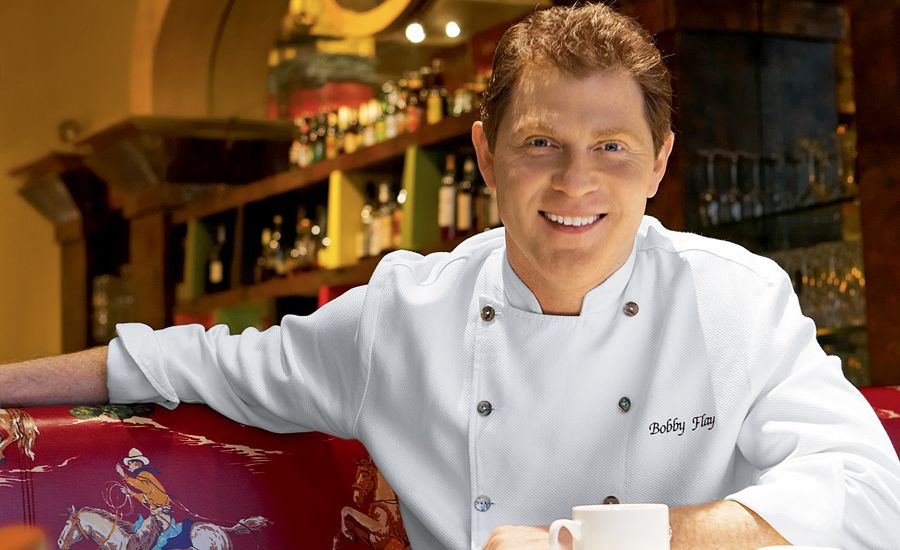A while back I took on a big commitment. I committed to a year volunteering at a public vocational high school in Queens. I went every week to teach a class, and just cooked with the kids.
It was a pretty amazing experience. I saw myself in a lot of them. The uncertainty, the insecurities were all there. These kids were a lot like me. Maybe that sounds surprising, coming from someone who’s been a success in the restaurant business. Let me tell you more.
Growing up, I never really thought about becoming a chef—much less owning restaurants or being on TV. The truth is, I didn’t really have any goals. I didn’t like school. I was unfocused.
ENJOYING THIS STORY? SUBSCRIBE TO GUIDEPOSTS MAGAZINE
Most of all, I liked hanging out with my buddies on the corner of Lexington Avenue and 84th Street, on Manhattan’s Upper East Side, where I was born and raised. Just shooting the breeze. That was the life I imagined for myself when I dropped out of high school. But someone had other plans for me.
I was lounging around at home one day, watching TV, when the phone rang. It was my dad. “Come to my office,” he said. “We need to talk about your life.”
My life? I was 17! Was I supposed to have it all figured out? It felt like being called to the principal’s office—but worse. My dad is a great guy. He’s also very scholarly, so my leaving school must have hit him hard. I didn’t want to let him down. But it seemed that was exactly what I was doing.
Part of me was scared. Part of me tried to play it cool: just Dad being Dad. I went down to his office at Joe Allen—a famous restaurant in the theater district that he was a partner in. “Go get a job,” he said. “You can’t just hang out with your friends on a street corner.”
“Okay,” I said nonchalantly, shrugged my shoulders and headed out to meet my friends. Where was I gonna find a job?
The next day, Dad called again. He sounded exasperated. I guess he figured out that my hunt hadn’t just been a bust, but a complete nonevent. “The busboy had to leave to take care of his grandmother. You’re going to fill in.”
Dad didn’t ask me; he told me. “And don’t forget: no special treatment. Because you’re my son, you better work harder than anyone else. Put your head down, do your job and don’t aggravate anybody—including me.”
I had my marching orders, and showed up at the restaurant the next day. And the day after that. I didn’t have much interest in the business, but I didn’t want to upset Dad. I showed up late sometimes—only to spot Dad waiting for me, eyes on his watch—but I did my job.
It wasn’t so bad. Clearing tables. Setting tables. Two weeks went by pretty fast. Now what? I wondered. “Do you want a job?” the chef asked me as I was walking out of the kitchen. I think the guy took pity on me.
“Sure,” I said.
He had me start in the pantry. That’s when my career really began. I stocked the pantry, washed dishes, learned how to clean lettuce. Used a knife. Made salad dressing. I didn’t think I had any natural skill, but it was gratifying to learn something. And my salads did taste pretty good.
About six months into my job at Joe Allen, something unexpected happened. I remember waking up one morning, staring at the ceiling and saying to myself, I’m really looking forward to going to work today.
Where did that come from?! Little things, I think. Learning new cooking techniques, watching my knife skills improve. From that point forward, I looked at work differently. I enjoyed it. I felt I was contributing. Slowly, I was shedding my irresponsible 17-year-old skin.
I was prepping in the kitchen one day when my dad and his business partner—and the restaurant’s namesake—Joe Allen, sauntered in. “We want to talk to Bobby about something,” Joe said to the chef. Uh-oh. What had I done wrong?
They took me up to the office. “There’s a new school opening,” Joe said. “It’s called The French Culinary Institute. Do you want to go?”
“Nah,” I said, “I don’t think so.” School and I didn’t get along so well. In truth, I thought I wasn’t good enough to go to cooking school. I had the idea in my head that, as a cook, you either had it or you didn’t. It didn’t come naturally to me.
Cleaning produce was one thing. But if I didn’t have “it” at 18, how could I ever possibly be a chef?
They talked me into it. I didn’t want to let them down. I studied for my high school equivalency test—a requirement to enter culinary school—and passed. That felt good, like I’d achieved something tangible.
To my surprise, I was looking forward to going back to school. It sounded like a great opportunity.
It was. The French Culinary Institute had just opened its doors. There were only nine students, but it was a mix of interesting people. I was the youngest by about six years.
Our teacher was a great guy—an old-school, formally trained Alsatian chef named Antoine Shaeffers. He was obviously a terrific cook; he also had a wonderful, buoyant personality.
Even the most mundane cooking-school tasks—like “turning” vegetables, paring them into perfect, uniform shapes—started to seem kind of interesting. But by then, anything having to do with food had become interesting to me.
And since I was still working at the restaurant by night and going to school by day, food really took over my life, 24/7.
The culinary program lasted six months. It was intense. I learned a lot. I went back to Joe Allen, thinking I’d move up the ranks in his restaurant. “Get out of here!” he said. “You’re not gonna learn anything else here.”
Wait a minute! I thought. I finally got comfortable doing something I liked, and Joe and my dad were pushing me out?
I couldn’t believe it. “I want to stay,” I pleaded. “I want to be the chef here someday. This is my career.” Did I say career? I guess I had grown up, at least a little.
They were unmoved. It was time for me to leave Joe Allen. I sent out résumés and pounded the pavement. I was hired as a sous-chef at a hot new restaurant on the Upper East Side. It was called Brighton Grill. They’d hired a chef from New Orleans.
Two days after the restaurant opened, I showed up at work (on time!) at 8:00 a.m. “We’ve got a problem,” one of the owners said to me. Uh-oh, I thought—again. But I knew I hadn’t done anything wrong. It was the chef.
“We found him passed out on the laundry bag. He apparently hit the tequila last night. Lots of it. He’s fired. You’re the chef now.”
I was in shock. It was like I’d been the understudy in a Broadway show, and was about to get my big break. But was I ready to perform? I could cook okay. I didn’t have much of a repertoire yet. But somehow I managed.
I stayed at Brighton for a year, learning every day. Then I was itching to move on, to try something new. At The French Culinary Institute I met a woman named Gail Arnold who was cooking in one of Jonathan Waxman’s restaurants.
Jonathan was known as one of the most inventive chefs around. I jumped at the chance to work at Bud’s—his place on the West Side.
That’s where I fell in love with the flavors of the southwest. Believe it or not, I’d never been to New Mexico or Arizona or Texas. But there was something about this food that I just instantly got, instantly loved.
We were cooking on a high level at Bud’s, with great ingredients. Things I’d never tasted before—papayas and mangoes, chili peppers and blue corn tortillas. All that stuff was completely new to me. And it was awesome.
And the crew was amazing—energetic cooks, eager to experiment. We all learned from each other. It was a rare, special, inspiring place.
I wound up working at all three of Jonathan’s restaurants. One was a tiny French bistro called Hulot’s. It was closed on Sundays. But here’s how passionate I’d become about cooking: Another chef and I would get the keys from the manager and show up there on Sunday afternoons—when the place was closed—just to cook. For fun.
That’s when I knew cooking was my life. I woke up every morning thinking about what I’d cook that day. I still do.
I worked in more kitchens. I kept learning, and experimenting. Finally, I was feeling ready to open a place of my own that would feature the bold, southwestern flavors I love. I wanted a bigger stage.
Of course I talked to my dad about it. If he agreed I was ready to make this move, that would be my green light. By then I knew to trust his judgment better than my own!
We started scouring the city for a good location. Then Jerry Kretchmer—who owned a famous restaurant called Gotham Bar and Grill—came by to talk to me about opening a place. “Do you want to open up a southwestern restaurant with me?” he asked.
That was a little awkward. I explained to him I’d been looking for a place with my dad.
“Well, think about it,” he said.
I went back to Dad. He actually seemed relieved. “Do it with him,” he urged me. “That way you and I can just be father and son.” Once again, wise counsel from my most trusted advisor. And soon my first restaurant, Mesa Grill, opened its doors.
That was more than 17 years ago. I still love every minute of it. I still wake up thinking about flavors, about new dishes to try. I still love the family atmosphere in the kitchen. (One of my rules? No yelling. I find it totally unproductive. We try to keep it fun and upbeat—like our food.)
I’m still amazed I was once that confused kid, without any clear sense of direction—and that there’d been a time when I worried I wasn’t good enough to go to culinary school. Do I ever have doubts? You bet.
It’s hard for me to think of myself as a great chef. I think of myself as someone who’s always learning, always wanting to cook better, more delicious food.
And that’s what I saw in those kids I met at the public high school in Queens—a desire to learn, a commitment to give it their best. At the end of that year, thanks to The French Culinary Institute, I was able to give one of them a scholarship. It was too hard to pick one kid. There was some real talent there.
I narrowed it down to five, and came up with a plan to secure scholarships for all of them. Sure, they’re a little rough around the edges, and have a long way to go, just like I did when I was their age.
But in my dad and his partner, Joe, I was blessed with supportive—and demanding—mentors who not only helped turn my life around, but also helped me find my passion. I can’t think of a better way to pay them back than to encourage other young people to find their passion too.
Did you enjoy this story? Subscribe to Guideposts magazine.




